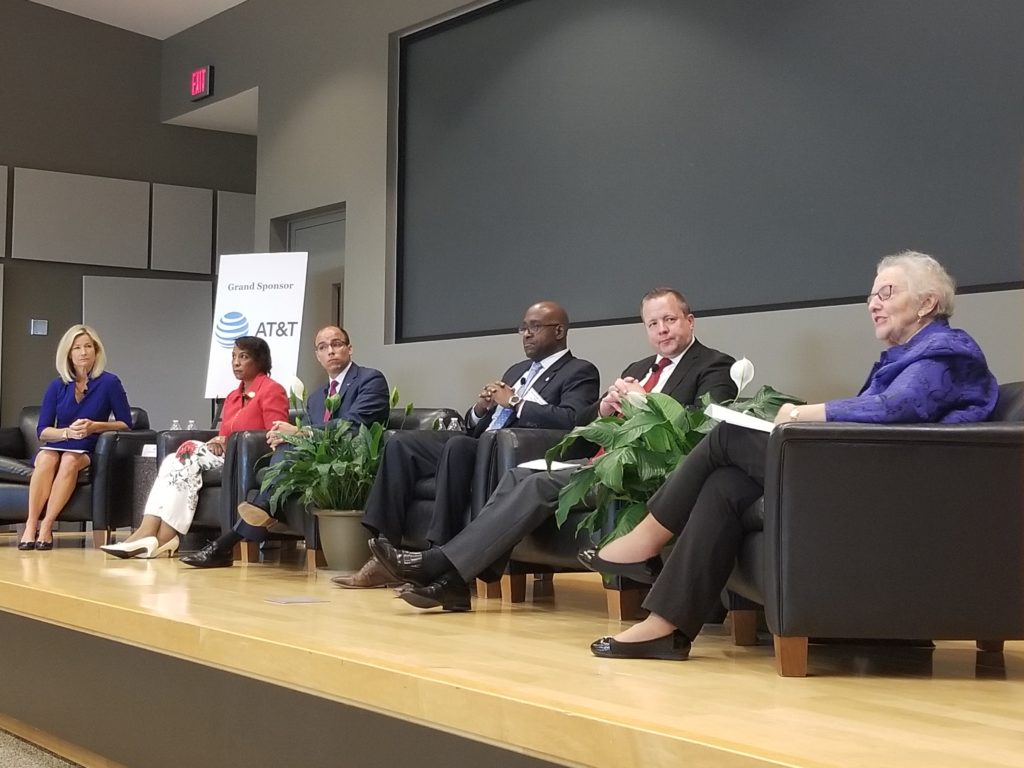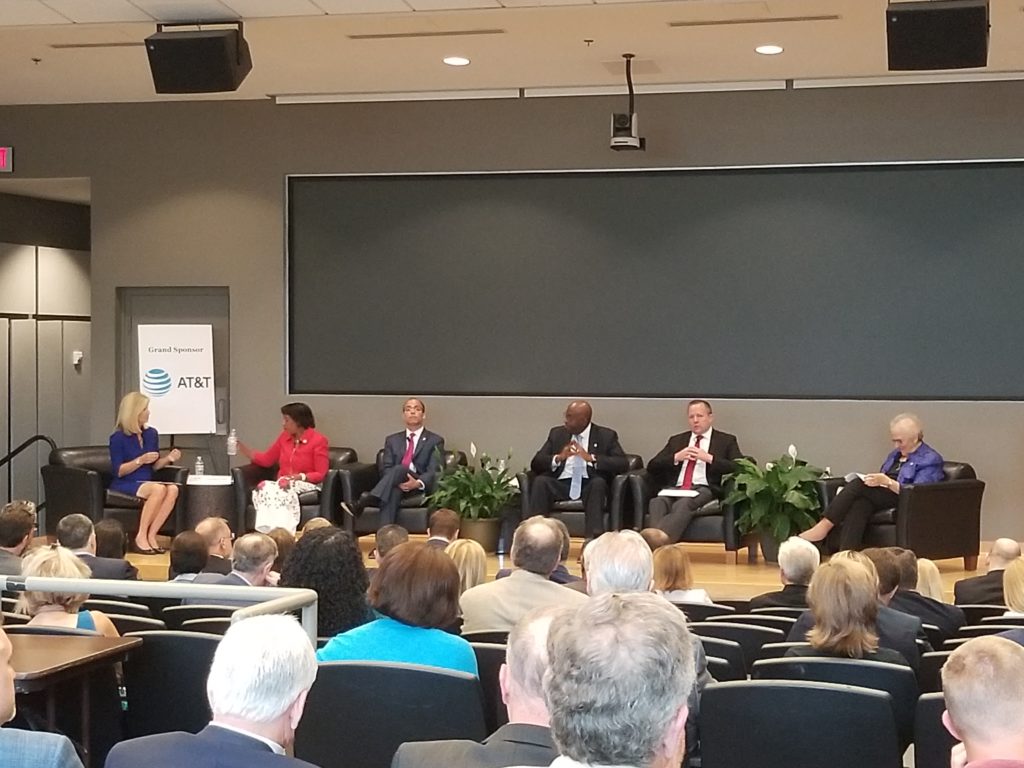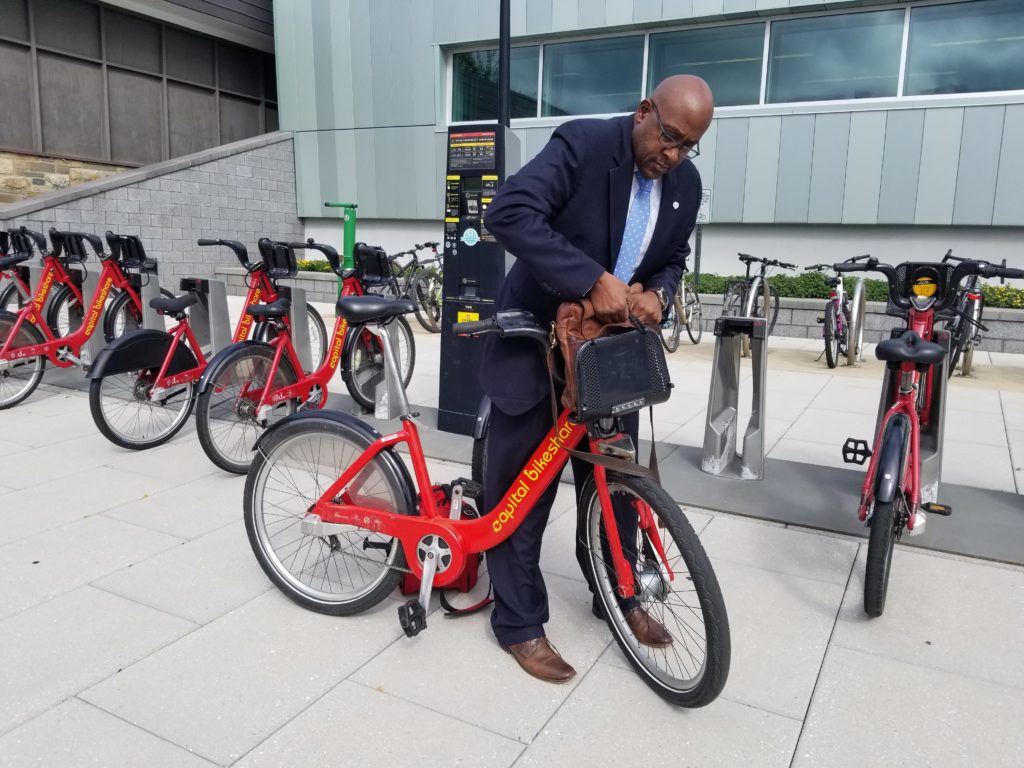The majority of local leaders agree that Northern Virginia needs more affordable housing and bus transit — though they differ on the details.
Local leaders discussed issues ranging from housing to the area’s overall economic health during the Northern Virginia Regional Elected Leaders Summit co-hosted by several local chambers of commerce at George Mason University’s Arlington campus earlier today (Monday).
Affordable Housing
Arlington Board Chair Christian Dorsey said he was working with the Metropolitan Washington Council of Governments to develop a “policy overlay” to help guide affordable housing across the region.
“We have one,” said Alexandria Mayor Justin Wilson. “It’s just entirely not deliberate, not coordinated, and not successful.”
Wilson and Dorsey both said that each jurisdiction has its own issues — like zoning for accessory dwelling units — but a guiding document could help align governments’ goals to fill the region’s growing housing need. One problem leaders believe is better solved together is how to build affordable housing that’s accessible to public transportation.
Fairfax County Board of Supervisors Vice Chair Penelope Gross said the skyrocketing price of housing near Metro stations bars the people who most need access to Metro from living nearby. Dorsey agreed that building affordable, transit-accessible housing was an important regional priority, and a better idea than building housing away from transit.
“We can’t just continue to grow housing and then try and build the supports with transportation infrastructure to meet where we built the housing,” said Dorsey. “That’s stupid.”
Phyllis Randall, Chair at Large of the Loudoun County Board of Supervisors, said she has tried to explain to constituents with kids that the people who benefit from affordable housing includes recent college graduates.
“I want them in the area,” she joked of her own children. “Not in my basement.”
Outgoing Prince William Board of County Supervisors Chair Corey Stewart, the only Republican on the stage Monday, was also the lone dissenter in that conversation. He pointed out that Prince William held a “disproportionate” share of affordable housing in the region, but still could not build enough because of restrictions on breaking up large, multi-acre lots that local leaders refused to amend.
“We need to let the private sector solve this problem,” he said.
Metro, Buses, and Shutdowns
Dorsey, who also sits on the WMATA Board of Directors, told the audience that the transit agency expects to conclude its Blue and Yellow line shutdown in Alexandria on time. That was welcome news for Alexandria’s leaders.
“It has been a difficult summer,” noted Wilson, who said that the silver lining of businesses hit hard by the shutdown is that more residents have been using the public bus system than ever.
Due to growing ridership this summer, the mayor announced Alexandria will extend its water taxi service to the Wharf through the December. The water, he said, was the region’s largest “untapped resource” when it came to transit development.
Gross and Dorsey both echoed support for more bus transit to help move more people and alleviate the region’s traffic woes, with Dorsey saying he wants “to see the attention to Metro’s buses that is paid to rail.”
Education and Workforce Training
Leaders also touched on a discussion about what role local universities should play in preparing residents for working in the increasingly high-tech focused market — a topical question considering that the University of Maryland and Virginia Tech are opening up new facilities close to Amazon’s new HQ2 in the Crystal City-Pentagon City area.
“I know that some people fear Amazon will impose a curriculum on George Mason, or Virginia Tech. But that’s not it at all,” said Dorsey, in apparent reference to the George Mason professor under fire for publishing an op-ed praising the company in the Washington Business Journal after letting Amazon’s PR department review it.
Not partnering with universities to prepare the region’s workforce for jobs like the ones at Amazon would do residents a “disservice,” Dorsey argued. He said part of the reason he’s excited for the company is its investment in early education opportunities — a priority emphasized by everyone on the dais.
Amazon announced a bevy of grants funding robotics programs in local schools this spring, including four $10,000 grants to Arlington elementary and middle schools.
Gross said that Amazon’s impending arrival also means region needs to invest in trade programs.
“If we have 25,000 people working for Amazon we also need nurses and dry cleaners,” she said.
(Monday’s summit was sponsored by Amazon and AT&T, and hosted by NBC 4’s Julie Carey.)
The Future of Transit
The group of elected officials were less in agreement about the details of how to house all of the 1.2 million new residents some estimates predict will move to the D.C. area by 2045.
When asked whether they thought electric scooters had become a vital part of the region’s transit network, for instance, only Randall raised her hand.
“They’ll be superseded soon by the pogo stick,” joked Dorsey, who may or may not have been aware of the Swedish company that is actually trying to offer rental pogo sticks. Dorsey added that innovation was a continuous and important process with transit.
Stewart said he foresaw a future with more ride hailing services and autonomous vehicles resulting in less private ownership of vehicles. However, he lambasted efforts to curtail the number of cars on the road, saying that there was an “over-emphasis on the importance of Metro and other mass transit” that ignored many people’s desire to start a trip at their home, in their own car.
Dorsey asked whether Stewart believed cars should continue to ferry one passenger at a time to which Stewart said that regional governments already encourage carpooling with HOV lanes, and autonomous vehicles could help reduce traffic and pollution in the same way.
Randall cautioned the audience afterward that the country was “not in the Jetsons era yet” and autonomous vehicles wouldn’t solve the region’s perennial parking problems.
At the end of the event, Dorsey said he was staying true to his commitment to multimodal transport by grabbing a Capital Bikeshare ride to his car.
“Now if only I can balance everything,” he joked while loading his bags on the bike.




